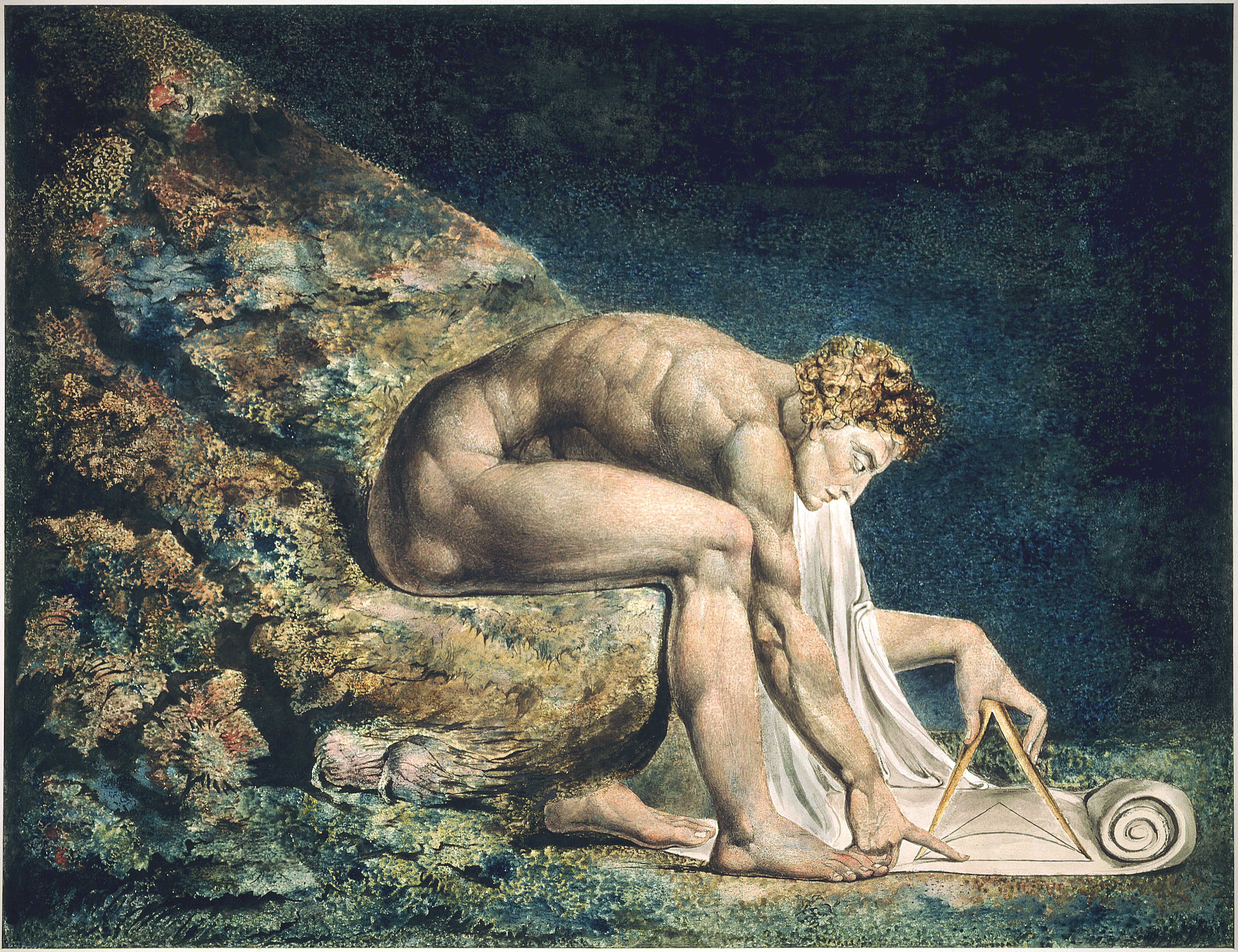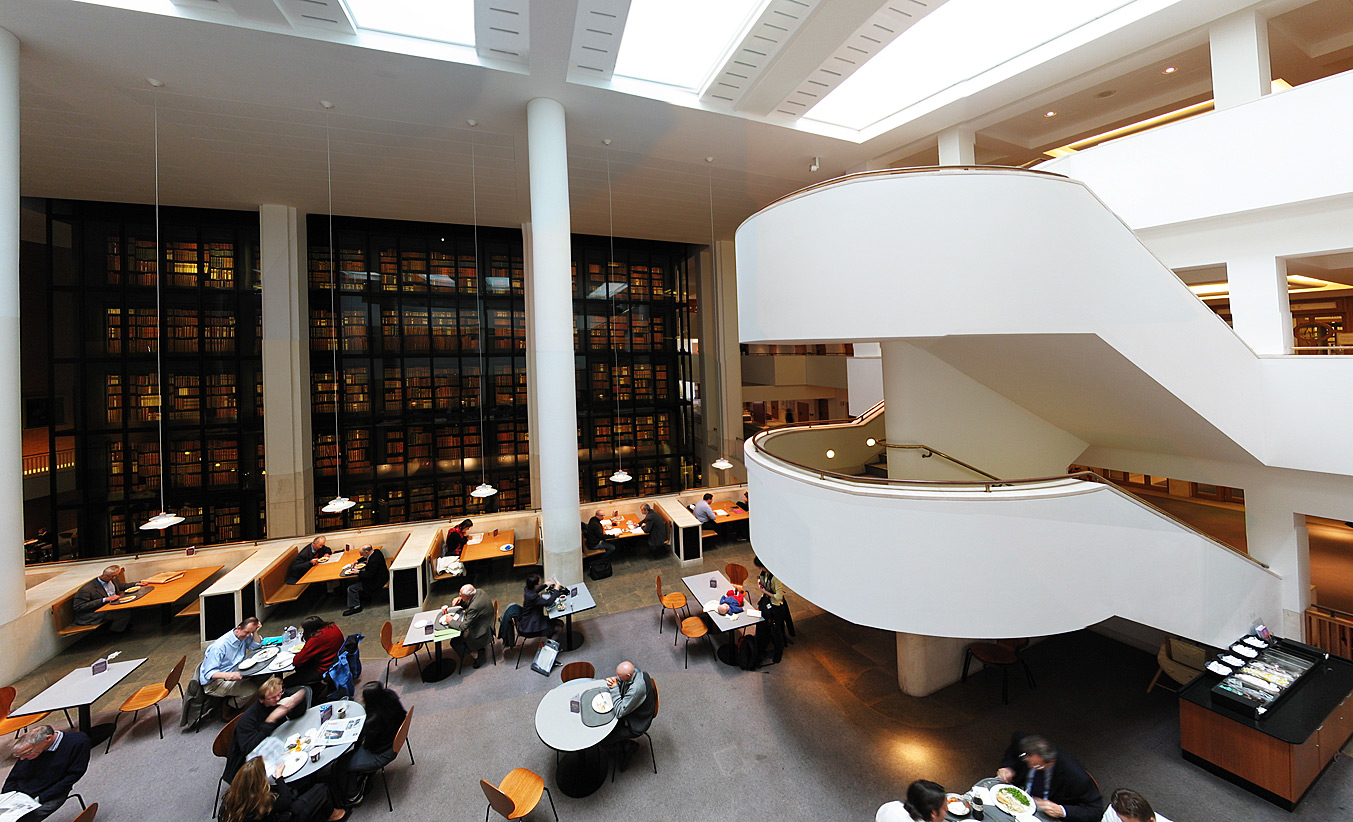|
Newton (Blake)
''Newton'' is a monotype by the English poet, painter and printmaker William Blake first completed in 1795, but reworked and reprinted in 1805. It is one of the 12 "Large Colour Prints" or "Large Colour Printed Drawings" created between 1795 and 1805, which also include his series of images on the biblical ruler ''Nebuchadnezzar''. Isaac Newton is shown sitting naked and crouched on a rocky outcropping covered with algae, apparently at the bottom of the sea. His attention is focused upon diagrams he draws with a compass upon a scroll. The compass is a smaller version of that held by Urizen in Blake's '' The Ancient of Days''. Blake's opposition to the Enlightenment was deeply rooted. In his annotation to his own engraving of the classical character Laocoön, Blake wrote "Art is the Tree of Life. Science is the Tree of Death." Newton's theory of optics was especially offensive to Blake, who made a clear distinction between the vision of the "vegetative eye" and spiritual visi ... [...More Info...] [...Related Items...] OR: [Wikipedia] [Google] [Baidu] |
Deism
Deism ( or ; derived from the Latin term '' deus'', meaning "god") is the philosophical position and rationalistic theology that generally rejects revelation as a source of divine knowledge and asserts that empirical reason and observation of the natural world are exclusively logical, reliable, and sufficient to determine the existence of a Supreme Being as the creator of the universe. More simply stated, Deism is the belief in the existence of God—often, but not necessarily, an impersonal and incomprehensible God who does not intervene in the universe after creating it, solely based on rational thought without any reliance on revealed religions or religious authority. Deism emphasizes the concept of natural theology—that is, God's existence is revealed through nature. Since the 17th century and during the Age of Enlightenment, especially in 18th-century England, France, and North America, various Western philosophers and theologians formulated a critical reject ... [...More Info...] [...Related Items...] OR: [Wikipedia] [Google] [Baidu] |
1795 Prints
Events January–June * January – Central England records its coldest ever month, in the CET records dating back to 1659. * January 14 – The University of North Carolina opens to students at Chapel Hill, becoming the first state university in the United States. * January 16 – War of the First Coalition: Flanders campaign: The French occupy Utrecht, Netherlands. * January 18 – Batavian Revolution in Amsterdam: William V, Prince of Orange, Stadtholder of the Dutch Republic (Republic of the Seven United Netherlands), flees the country. * January 19 – The Batavian Republic is proclaimed in Amsterdam, ending the Dutch Republic (Republic of the Seven United Netherlands). * January 20 – French troops enter Amsterdam. * January 23 – Flanders campaign: Capture of the Dutch fleet at Den Helder: The Dutch fleet, frozen in Zuiderzee, is captured by the French 8th Hussars. * February 7 – The Eleventh Amendment to the United States ... [...More Info...] [...Related Items...] OR: [Wikipedia] [Google] [Baidu] |
Works By William Blake
Works may refer to: People * Caddy Works (1896–1982), American college sports coach * John D. Works (1847–1928), California senator and judge * Samuel Works (c. 1781–1868), New York politician Albums * ''Works'' (Pink Floyd album), a Pink Floyd album from 1983 * ''Works'', a Gary Burton album from 1972 * ''Works'', a Status Quo album from 1983 * ''Works'', a John Abercrombie album from 1991 * ''Works'', a Pat Metheny album from 1994 * ''Works'', an Alan Parson Project album from 2002 * ''Works Volume 1'', a 1977 Emerson, Lake & Palmer album * ''Works Volume 2'', a 1977 Emerson, Lake & Palmer album * '' The Works'', a 1984 Queen album Other uses *Good works, a topic in Christian theology * Microsoft Works, a collection of office productivity programs created by Microsoft * IBM Works, an office suite for the IBM OS/2 operating system * Mount Works, Victoria Land, Antarctica See also * The Works (other) * Work (other) Work may refer to: * Work ( ... [...More Info...] [...Related Items...] OR: [Wikipedia] [Google] [Baidu] |
Tate Publishing Ltd
Tate Publishing is a publisher of visual arts books, associated with the Tate Gallery in London, England. It was established in 1911; nowadays it is a division of Tate Enterprises Ltd, an independent company wholly owned by the Trustees of Tate, and is based at Tate Britain, Millbank, London. , Applegate Business to Business Directory. Retrieved 2009-09-02. In 2001, it produced 30 new book titles and had gross sales of £4 million, a large increase over previous years due to the opening of the Tate Modern
Tate Modern is an art gallery in London, housing the United Kingdom's national collection of international Modern art, modern and contemporary art (creat ...
[...More Info...] [...Related Items...] OR: [Wikipedia] [Google] [Baidu] |
Donald Ault
Donald D. Ault ( ; October 5, 1942 – April 13, 2019) was an American academic who was a professor at the University of Florida and is primarily known for his work on British Romantic poet William Blake, British physicist Sir Isaac Newton and American comics artist Carl Barks. He is also known as a foundational figure in the development of American comics studies, and was the General Editor of the academic journal devoted to comics called '' ImageTexT''. Career Donald Ault graduated from the University of Chicago in 1968, after completing work on his dissertation tracing the conflict between British physicist Sir Isaac Newton and William Blake. Since then, he has taught at University of California, Berkeley, Vanderbilt University, and the University of Florida. Working with William Blake Ault's interests are wide and include everything from Romantic poetry to psychophysics, holography, psychoanalysis, deconstruction, typography, mathematical notation, and the history of animation ... [...More Info...] [...Related Items...] OR: [Wikipedia] [Google] [Baidu] |
British Library
The British Library is the national library of the United Kingdom. Based in London, it is one of the largest libraries in the world, with an estimated collection of between 170 and 200 million items from multiple countries. As a legal deposit library, it receives copies of all books produced in the United Kingdom and Ireland, as well as a significant proportion of overseas titles distributed in the United Kingdom. The library operates as a non-departmental public body sponsored by the Department for Culture, Media and Sport. The British Library is a major research library, with items in many languages and in many formats, both print and digital: books, manuscripts, journals, newspapers, magazines, sound and music recordings, videos, play-scripts, patents, databases, maps, stamps, prints, drawings. The Library's collections include around 14 million books, along with substantial holdings of manuscripts and items dating as far back as 2000 BC. The library maintains a programme for ... [...More Info...] [...Related Items...] OR: [Wikipedia] [Google] [Baidu] |
Newton, After William Blake
''Newton'', sometimes known as ''Newton after Blake'', is a 1995 work by the sculptor Eduardo Paolozzi. The large bronze sculpture is displayed on a high plinth in the piazza outside the British Library in London. The sculpture is based on William Blake's 1795 print of ''Newton: Personification of Man Limited by Reason'', which depicts a nude Isaac Newton sitting on ledge beside a mossy rock face while measuring with a pair of compasses or dividers. The print was intended by Blake to criticise Newton's profane knowledge, usurping the sacred knowledge and power of the creator Urizen, with the scientist turning away from nature to focus on his books. Paolozzi had admired Blake since viewing a large print of ''Newton'' at the Tate Gallery in the 1940s. He was also a friend of Colin St John Wilson, the architect of the British Library, since they both participated in the This is Tomorrow exhibition at the Whitechapel Gallery in 1956. Wilson intended to site a seated scu ... [...More Info...] [...Related Items...] OR: [Wikipedia] [Google] [Baidu] |
Eduardo Paolozzi
Sir Eduardo Luigi Paolozzi (, ; 7 March 1924 – 22 April 2005) was a Scottish artist, known for his sculpture and graphic works. He is widely considered to be one of the pioneers of pop art. Early years Eduardo Luigi Paolozzi was born on 7 March, 1924, in Leith, Edinburgh, Scotland, and was the eldest son of Italian immigrants. His family was from Viticuso, in the Lazio region. Paolozzi's parents, Rodolfo and Carmela, ran an ice cream shop. Paolozzi used to spend all his summers at his grandparents place in Monte Cassino and grew up bilingual. In June 1940, when Italy declared war on the United Kingdom, Paolozzi was interned (along with most other Italian men in Britain). During his three-month internment at Saughton prison his father, grandfather and uncle, who had also been detained, were among the 446 Italians who drowned when the ship carrying them to Canada, the ''Arandora Star'', was sunk by a German U-boat. Paolozzi studied at the Edinburgh College of Art in 1943, brie ... [...More Info...] [...Related Items...] OR: [Wikipedia] [Google] [Baidu] |
John Locke
John Locke (; 29 August 1632 (Old Style and New Style dates, O.S.) – 28 October 1704 (Old Style and New Style dates, O.S.)) was an English philosopher and physician, widely regarded as one of the most influential of the Enlightenment thinkers and commonly known as the "father of liberalism". Considered one of the first of the British empiricists, following the tradition of Francis Bacon, Locke is equally important to social contract theory. His work greatly affected the development of epistemology and political philosophy. His writings influenced Voltaire and Jean-Jacques Rousseau, and many Scottish Enlightenment thinkers, as well as the American Revolutionaries. His contributions to classical republicanism and liberal theory are reflected in the United States Declaration of Independence. Internationally, Locke's political-legal principles continue to have a profound influence on the theory and practice of limited representative government and the protection of basic right ... [...More Info...] [...Related Items...] OR: [Wikipedia] [Google] [Baidu] |
Francis Bacon
Francis Bacon, 1st Viscount St Alban (; 22 January 1561 – 9 April 1626) was an English philosopher and statesman who served as Attorney General and Lord Chancellor of England under King James I. Bacon argued for the importance of natural philosophy, guided by the scientific method, and his works remained influential throughout the Scientific Revolution. Bacon has been called the father of empiricism. He argued for the possibility of scientific knowledge based only upon inductive reasoning and careful observation of events in nature. He believed that science could be achieved by the use of a sceptical and methodical approach whereby scientists aim to avoid misleading themselves. Although his most specific proposals about such a method, the Baconian method, did not have long-lasting influence, the general idea of the importance and possibility of a sceptical methodology makes Bacon one of the later founders of the scientific method. His portion of the method based in ... [...More Info...] [...Related Items...] OR: [Wikipedia] [Google] [Baidu] |
Scientific Materialism
Metaphysical naturalism (also called ontological naturalism, philosophical naturalism and antisupernaturalism) is a philosophical worldview which holds that there is nothing but natural elements, principles, and relations of the kind studied by the natural sciences. Methodological naturalism is a philosophical basis for science, for which metaphysical naturalism provides only one possible ontological foundation. Broadly, the corresponding theological perspective is religious naturalism or spiritual naturalism. More specifically, metaphysical naturalism rejects the supernatural concepts and explanations that are part of many religions. Definition In Carl Sagan’s words: "The Cosmos is all that is or ever was or ever will be." According to Arthur C. Danto, naturalism, in recent usage, is a species of philosophical monism according to which whatever exists or happens is ''natural'' in the sense of being susceptible to explanation through methods which, although paradigmatically ... [...More Info...] [...Related Items...] OR: [Wikipedia] [Google] [Baidu] |






